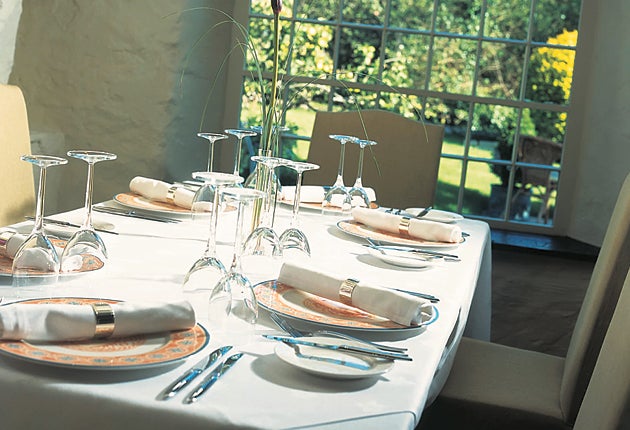From gate to plate – chefs grow their own
More restaurants are getting in on the idea that when it comes to taste local is best. So, now they are producing their own meat and vegetables

Your support helps us to tell the story
From reproductive rights to climate change to Big Tech, The Independent is on the ground when the story is developing. Whether it's investigating the financials of Elon Musk's pro-Trump PAC or producing our latest documentary, 'The A Word', which shines a light on the American women fighting for reproductive rights, we know how important it is to parse out the facts from the messaging.
At such a critical moment in US history, we need reporters on the ground. Your donation allows us to keep sending journalists to speak to both sides of the story.
The Independent is trusted by Americans across the entire political spectrum. And unlike many other quality news outlets, we choose not to lock Americans out of our reporting and analysis with paywalls. We believe quality journalism should be available to everyone, paid for by those who can afford it.
Your support makes all the difference.It's an old gardeners' adage that nothing tastes as good as a home-grown vegetable. But that was before some of Britain's best restaurants started planting their own kitchen gardens to cash in on the soaring popularity of locally sourced food.
Chefs from London to Loch Voll are growing their own produce, from bumper crops of carrots to unusual herbs they find difficult to source. Some restaurants are rearing their own animals to give diners the ultimate gate-to-plate experience.
In France and the US the "locavore" movement is well established, and the idea is catching on at last in Britain's restaurants. Richard Harden, of Harden's London Restaurants guide, said: "We had lost our connection with food, so this is about trying to get closer to what we eat."
The award-winning chef Simon Rogan has run Howbarrow Organic Farm alongside his L'Enclume restaurant in Cartmel, Cumbria, since last year. He said: "The organic produce we serve now just costs us the price of the seed. For us it's a quality thing: we can pick things out of the ground when we want." Eventually he hopes to cut his "six-figure" annual vegetable bill down to zero.
Although chefs such as Mr Rogan, or the French culinary legend Alain Passard, whose farm in Brittany supplies his Parisian restaurant, L'Arpège, are at the radical end of the scale, even London-based chefs are sowing seeds where they can. Shane Osborn has planted a garden on the roof of his double Michelin-starred London restaurant, Pied à Terre. Nuno Mendes, the Portuguese El Bulli-trained chef, is picking his own herbs for his Viajante restaurant in east London, which opened this year.
They follow the likes of Oxfordshire's Raymond Blanc, who has served diners at Le Manoir aux Quat'Saisons vegetables grown in his two-acre kitchen garden for several years, and Nigel Haworth, whose celebrated Lancashire hotel and restaurant, Northcote Manor, was another early pioneer. Other restaurants that grow-their-own include the Nut Tree Inn, Oxfordshire, and Monachyle Mhor, on Loch Voll in Perthshire.
Restaurateurs who lack the space to get planting are finding other methods. Tony McKinlay, who owns the south London restaurant Platform, has gone into partnership with one of his suppliers, the Devon-based farmer Barnaby Butterfield. The pair are both shareholders in a company that runs a central kitchen where the animal carcases are butchered and prepped before being dished up at Platform. The aim is to use every bit of the animal.
"When we have cooked all the steaks we serve dishes made with [cuts such as] Jacob's ladder and brisket. For foodies, that's really interesting," Mr McKinlay said. Eventually he hopes to supply other food companies with some of the cuts that can't make their way on to his restaurant menu. However, he says, "in our high street location, I don't think enough customers are bothered about what we're doing. They might want a steak, but we'll only get 15 or so from a cow."
Richard Harden warned restaurants risked "tipping into parody" if they become "too self-congratulatory" about what they are doing. "There's not necessarily a link between all this foodie lovey-ness and producing a good dinner. It can end up putting people off," he said.
Join our commenting forum
Join thought-provoking conversations, follow other Independent readers and see their replies
Comments